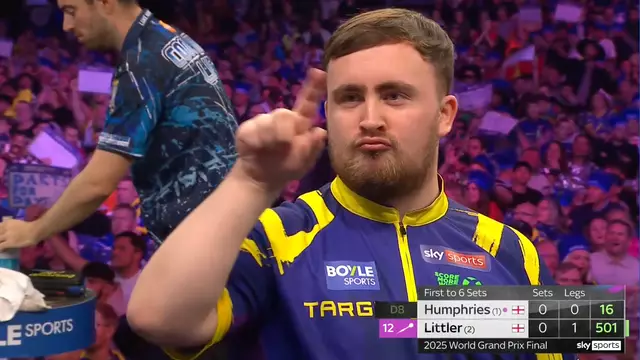
In the electrifying glow of Leicester’s Mattioli Arena, where the air hummed with the sharp crack of darts hitting the board and the roar of a fervent crowd, 18-year-old sensation Luke Littler teetered on the edge of utter embarrassment. Facing off against world No. 1 Luke Humphries in the 2025 BoyleSports World Grand Prix final, the teenage prodigy—already a household name after his meteoric rise—found himself staring down a potential “brush,” the ultimate darting indignity where a player fails to score a single point in a leg. But in a moment of pure, instinctive genius, Littler unleashed his secret weapon: an “imaginary circle” traced around the board with his finger, followed by a comically exaggerated grimace that had fans and pundits alike chuckling in disbelief. It worked like a charm, propelling him to finally nail that elusive double and steer clear of what could have been a career-highlight low point. The match, a best-of-11-sets thriller that stretched the limits of tension, ultimately crowned Littler as the new king of the double-start domain, etching his name into darts folklore with a narrow 6-5 victory after two hours of unrelenting intensity.
The World Grand Prix, darts’ most unforgiving TV major with its mandatory double-start format—where every leg begins with a double to ignite the scoreboard—has long been a proving ground for the sport’s elite. This year, from October 6 to 12, it drew 32 of the world’s sharpest throwers to the historic arena, a venue pulsing with the ghosts of legends like Phil Taylor and Michael van Gerwen. Littler, the world champion fresh off a string of 2025 triumphs including the World Matchplay, entered as the No. 2 seed, his youthful swagger masking a hunger for his first Grand Prix crown. Humphries, the 2023 winner and three-time defending finalist, arrived as the formidable favorite, his cool composure and pinpoint accuracy having carried him to four titles and six finals this year alone. Their head-to-head, skewed 14-10 in Humphries’ favor overall but a tighter 6-4 in 2025, promised fireworks—and it delivered in spades.
Littler’s path to the final was a rollercoaster of brilliance and brinkmanship. He kicked off with a record-shattering 11-minute demolition of Dutch youngster Gian van Veen in the first round, the pair posting two of the highest averages in tournament history—over 100 each—in a blur of 180s and ruthless checkouts. Thursday brought another masterclass, as he dismantled defending champion Mike De Decker 3-0, sealing the rout with a blistering 170 finish while De Decker floundered, missing 41 doubles across 11 legs. But Friday’s quarterfinal against Gerwyn Price tested his mettle like never before. Trailing 2-0 in sets, Littler clawed back with three straight, surviving three match darts in a frantic final-leg decider. There, Price had unleashed a sublime 156 outshot, only for Littler to counter with an astonishing 152 checkout against the throw—a dagger that left the Welshman stunned and the crowd in rapture. “I thought my tournament was done,” Littler admitted post-match, his voice laced with relief. “It was now or never—I just had to dig deep.”
Saturday’s semifinal offered no respite. Pitted against Jonny Clayton, Littler stormed to a 5-1 demolition, firing 10 maximums and averaging a clinical 97.26. He raced through the first two sets with back-to-back 15-darters, weathered a gritty third-set fightback capped by Clayton’s stunning 154 and 128 bullseye finishes, then reeled off three more sets without dropping a leg. A dramatic 140 clinched the fourth in a decider, setting up the dream “Luke vs. Luke” finale. Humphries, meanwhile, had methodically dismantled Cameron Menzies 3-1 in the quarters before edging Danny Noppert 5-3 in the semis, his 25 tournament 180s (one every 0.35 legs) underscoring his relentless form.
Sunday’s showdown exploded from the first double-in. Humphries, leveraging his tops-and-tens mastery, seized an early 2-0 sets lead, his flat trajectory pinning Littler on the back foot. The teenager responded with fire, leveling at 2-2 through sheer willpower, his 24 maximums (one every 0.39 legs) keeping pace with the world No. 1’s output. Sets flipped like a coin toss—Humphries edged 3-2, Littler countered 3-3—until the pivotal eighth, where the “imaginary circle” moment unfolded. Littler, mired on 16 after 12 futile darts, traced that whimsical loop around the board, pulled a face that screamed mock frustration, and on the 13th try, buried the double 16. The arena erupted; Humphries needed just 16 to claim the leg, leaving Littler stranded at 501—a brush by a whisker. “That was close—too close,” Littler later quipped, flashing his trademark grin. “The circle’s my lucky charm; don’t knock it till you’ve tried it!”
The drama peaked in the decider. Tied 5-5, Littler broke Humphries’ throw with a surgical 161 earlier echoed in his semi, then held firm under pressure. Humphries, who had won three of their last five major finals, pushed to the brink, but a missed double handed Littler the chance. The 18-year-old, tournament stats gleaming—high finishes, low bogey legs—sealed it with a cool 94 checkout, collapsing in joyous disbelief as confetti rained down. At 18, Littler became the youngest World Grand Prix winner ever, pocketing £120,000 from the £450,000 prize pot and boosting his 2025 haul to eight titles and ten finals (five TV majors).
Post-match, the mutual respect shone through. Humphries, gracious in defeat, hailed his rival: “Luke’s the real deal—he’s got that killer instinct I can only dream of.” Littler, trophy in hand, returned the praise: “Playing Luke is always a battle; he’s the benchmark. But tonight, the circle worked its magic.” This victory, Littler’s sixth TV major final win in 2025, narrows the head-to-head to 11-14 and positions him to chase a historic quadruple before year’s end. In a sport of split-second decisions and unyielding pressure, Littler’s blend of prodigious talent and playful superstition reminds us why darts captivates: it’s not just about the score, but the stories that stick. As the Mattioli Arena lights faded, one thing was clear—the “Nuke” isn’t just avoiding humiliation; he’s redefining dominance, one imaginary loop at a time.
Leave a Reply